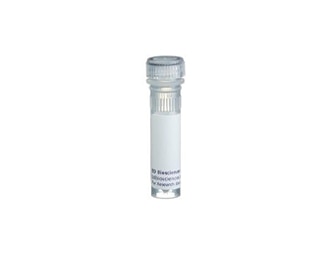Old Browser
This page has been recently translated and is available in French now.
Looks like you're visiting us from {countryName}.
Would you like to stay on the current country site or be switched to your country?




Two-color analysis of the expression of CD81 on mouse and rat splenocytes. C57BL/6 splenocytes were simultaneously stained with FITC Rat anti-Mouse CD45R/B220 (Cat. no. 553087/553088, First and second panels) and PE Hamster IgG1 κ Isotype Control (Cat. no. 553972, First panel) or PE Hamster Anti-Mouse/Rat CD81 (Cat. No, 559519; Second panel) monoclonal antibodies. Similarly, LOU splenocytes were simultaneously stained with FITC Mouse anti-Rat CD45RA (Cat. No. 554883, Third and last panels) and PE Hamster IgG1 κ Isotype Control (Cat. no. 553972; Third panel) or PE Hamster anti-Mouse/Rat CD81 (Cat. No, 559519; Last panel) monoclonal antibodies. Flow cytometry was performed on a BD FACScan™ Flow Cytometry System (BD Biosciences,San Jose, CA


BD Pharmingen™ Biotin Hamster Anti-Mouse/Rat CD81

Regulatory Status Legend
Any use of products other than the permitted use without the express written authorization of Becton, Dickinson and Company is strictly prohibited.
Preparation And Storage
Product Notices
- Since applications vary, each investigator should titrate the reagent to obtain optimal results.
- Please refer to www.bdbiosciences.com/us/s/resources for technical protocols.
- Although hamster immunoglobulin isotypes have not been well defined, BD Biosciences Pharmingen has grouped Armenian and Syrian hamster IgG monoclonal antibodies according to their reactivity with a panel of mouse anti-hamster IgG mAbs. A table of the hamster IgG groups, Reactivity of Mouse Anti-Hamster Ig mAbs, may be viewed at http://www.bdbiosciences.com/documents/hamster_chart_11x17.pdf.
- Caution: Sodium azide yields highly toxic hydrazoic acid under acidic conditions. Dilute azide compounds in running water before discarding to avoid accumulation of potentially explosive deposits in plumbing.
- For fluorochrome spectra and suitable instrument settings, please refer to our Multicolor Flow Cytometry web page at www.bdbiosciences.com/colors.
- An isotype control should be used at the same concentration as the antibody of interest.
Companion Products


.png?imwidth=320)
.png?imwidth=320)
The Eat2 monoclonal antibody specifically binds to CD81, a 26-kDa nonglycosylated member of the transmembrane 4 integral membrane protein superfamily, expressed by many types of cells. For example, CD81 participates with CD19 and CD21 in the signal transduction complex associated with the B-cell receptor on human B lymphocytes and with the CD4 and CD8 co-receptors on human thymocytes and T lymphocytes. In mouse fetal thymic organ culture, interactions of immature thymocytes with CD81 expressed by thymic stromal cells are required to induce development of T cells with αβ T-cell receptors. Furthermore, CD81 has been shown to play a role in the regulation of rat mastcell degranulation. Despite its important roles in the immune response and wide tissue distribution, CD81-deficient mice are born without obvious developmental abnormalities. However, these mice have abnormal immune responses, and impaired fertility. Eat2 mAb cross-reacts with the rat CD81 antigen.
Development References (10)
-
Boismenu R, Rhein M, Fischer WH, Havran WL. A role for CD81 in early T cell development. Science. 1996; 271(5246):198-200. (Biology). View Reference
-
Deng J, Yeung VP, Tsitoura D, DeKruyff RH, Umetsu DT, Levy S. Allergen-induced airway hyperreactivity is diminished in CD81-deficient mice. J Immunol. 2000; 165(9):5054-5061. (Biology). View Reference
-
Fleming TJ, Donnadieu E, Song CH, Laethem FV, Galli SJ, Kinet JP. Negative regulation of Fc epsilon RI-mediated degranulation by CD81. J Exp Med. 1997; 186(8):1307-1314. (Biology). View Reference
-
Levy S, Todd SC, Maecker HT. CD81 (TAPA-1): a molecule involved in signal transduction and cell adhesion in the immune system. Annu Rev Immunol. 1998; 16:89-109. (Biology). View Reference
-
Maecker HT, Do MS, Levy S. Maecker HT, Do MS, Levy S. Proc Natl Acad Sci U S A. 1998; 95(5):2458-2462. (Biology). View Reference
-
Maecker HT, Levy S. Normal lymphocyte development but delayed humoral immune response in CD81-null mice. J Exp Med. 1997; 185(8):1505-1510. (Biology). View Reference
-
Maecker HT, Todd SC, Kim EC, Levy S. Differential expression of murine CD81 highlighted by new anti-mouse CD81 monoclonal antibodies. Hybridoma. 2000; 19(1):15-22. (Immunogen). View Reference
-
Miyazaki T, Müller U, Campbell KS. Normal development but differentially altered proliferative responses of lymphocytes in mice lacking CD81. EMBO J. 1997; 16(14):4217-4225. (Biology). View Reference
-
Tedder TF, Zhou LJ, Engel P. The CD19/CD21 signal transduction complex of B lymphocytes. Immunol Today. 1994; 15(9):437-442. (Biology). View Reference
-
Tsitsikov EN, Gutierrez-Ramos JC, Geha RS. Impaired CD19 expression and signaling, enhanced antibody response to type II T independent antigen and reduction of B-1 cells in CD81-deficient mice. Proc Natl Acad Sci U S A. 1997; 94(20):10844-10849. (Biology). View Reference
Please refer to Support Documents for Quality Certificates
Global - Refer to manufacturer's instructions for use and related User Manuals and Technical data sheets before using this products as described
Comparisons, where applicable, are made against older BD Technology, manual methods or are general performance claims. Comparisons are not made against non-BD technologies, unless otherwise noted.
For Research Use Only. Not for use in diagnostic or therapeutic procedures.
Report a Site Issue
This form is intended to help us improve our website experience. For other support, please visit our Contact Us page.